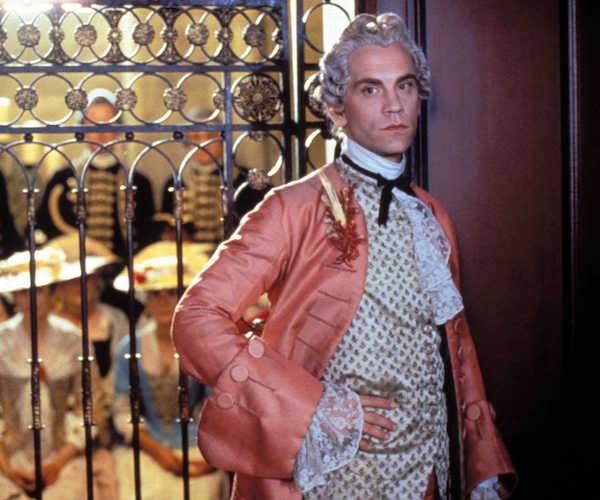Critical Commentary: The Shaky Life of a Film Critic
By Gerald Peary
Cinema reviewing exists as a respected profession only as long as the traditional role of the critic is honored.

Was John Malkovich incredibly sexy, a perfect Valmont in Les Liasons Dangereuses? The critic stays mum.
Most Europeans I’ve met are garrulous, ever-flowing fountains of cultural talk, with self-assured opinions about everything vaguely artistic, high and low, from Third World literature to the “B” sides of Beatles 45s. But what they know best, and discuss most confidently, are movies. Old and new ones, Hollywood ones, esoteric ones.
Most Americans I know are so narrowly educated, so focused on their specialty jobs, so occupied with tech issues and the Internet, that they are frightened to make judgments when it comes to the arts, even film. Especially the most educated ones: only the young are cocky in their judgments. But the more schooling, the more Americans will turn to the canonical words of critics for the Boston Globe, New York Times, or Anthony Lane in the New Yorker before venturing to a film. At how many dinner parties have even I been approached as omniscient film critic to give validation to someone’s humble “amateur” opinion. “My wife and I saw this movie last week and she didn’t like it but I thought it was great. We wonder what you think?”
What I think is that film critics, even in this diminished world, have a good thing going. We’re paid to watch movies and tell other people whether they’re good or bad. In my case, I’ve traveled the world for decades going to film festivals and reporting to those stuck back home what pictures they should look out for.
But then along comes postmodern theory to ruin it all. If, as postmodernists insinuate, movies are open-ended texts inviting as many readings as there are viewers, what necessary service is provided by the professional film reviewer? A critic may have seen and scrutinized 5,000 films, but his/her reading of a particular film is still just one more way to look at a work. Maybe a more interesting way, or a more sophisticated way, but in no important sense the right way.
Cinema reviewing exists as a respected profession only as long as the traditional role of the critic is honored: to provide a privileged explanation of the meaning of a filmic work along with a privileged evaluation of its worth. What if Joe Blow’s rave reading of, say, Avengers: Endgame (“Dude, it’s totally awesome when Banner visits the Sanctom Sanctorum and gets the Ancient One to give him the Time Stone!”) is as valid as a New Yorker appreciation by the late Pauline Kael?
I mean, if film critics know something special, secret, and true about the aesthetics of cinema, why do we so consistently disagree? I have friends who also write about movies and teach college classes about movies. I don’t remember a single time we’ve been unanimous on the worthiness of a film. I recall attending a talk by another friend, an astute feminist critic, who accompanied her words with carefully chosen clips of Hollywood pictures. These represented for her either (con) the most flagrant sexism or (pro) rare instances of “positive images” of women. I was amazed, because I read eight of the ten scenes she showed in exactly the opposite way. Her “positive images” seemed to me totally retrograde and sexist, and vice versa.
Is one of us brilliant in interpreting movies and the other a philistine bonehead? Or, more likely, does everyone, critic and noncritic, see each film in his or her own inimitable way? I think of my late biologist dad who responded for the rare movies he saw only to scenes with animals. For my father, a good film was one with dogs and cattle in it or, best, with water buffaloes. What’s a good film to you? Ingmar Bergman’s Persona? Or something with space ships blowing up? It’s all subjective.
I still recall a Thanksgiving dinner long ago when the conversation segued to Les Liasons Dangereuses and John Malkovich’s appropriateness as Valmont, the seducer. One women thought he was incredibly sexy, a perfect Valmont. Another thought Malkovich a good actor who was miscast. Another hated Malkovich in anything, and said the actor ruined the film.
And Mr. Film Critic? The final word? I remember staying silent, chomping on my turkey leg.
Gerald Peary is a Professor Emeritus at Suffolk University, Boston, curator of the Boston University Cinematheque, and the general editor of the “Conversations with Filmmakers” series from the University Press of Mississippi. A critic for the late Boston Phoenix, he is the author of nine books on cinema, writer-director of the documentaries For the Love of Movies: the Story of American Film Criticism and Archie’s Betty, and a featured actor in the 2013 independent narrative Computer Chess. His new feature documentary, The Rabbi Goes West, co-directed by Amy Geller, is playing at film festivals around the world.

I prefer interpretation over judgment. In Walter Kerr’s distinction that makes me a shameless Critic not Reviewer.
You are a fine interpreter, Maurice. Most film critics say that the most important part of their review is not the judgment, but readers, I think, focus far more on “good or bad?”